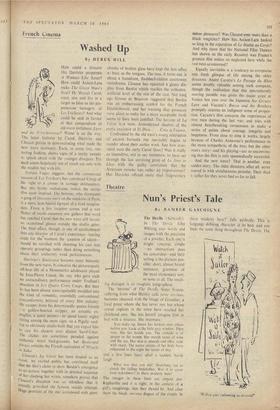French Cinema
Washed Up
By DEREK 'HILL the modish but with life. .
Terrain Vague suggests :hat the commercial success of Les Tricheurs has convinced Carrie of his right to ,a corner in teenage delinquency. But this feeble melodrama makes the earlier film seem inspired. The heroine, who dominates a gang of blousons noirs on the outskirts of Paris, is a stern. lank-haired .figment of a tired imagina- tion. From a few location scenes and a wee flicker of social comment one gathers that word has reached Carne that the new wave still favour an occasional 'glance outside the studio. gates. The final effect, though, is one of astonishment that any director of Carnes experience—leaving. aside for the moment the question of talent— should be satisfied with shunting his . cast into operatic groupings rather than doing something about their uniformly weak performances.
Duvivier's bide raid borrows more blatantly from the new wave. It concerns the picturesquely off-beat life of a Montmartre adolescent played by Jean-Pierre 1.6aud. the nuy who gave such an extraordinary performance under 'Truffaut's direction in Le.s Quatre Cents Coups. But here he has been almost unrecognisably moulded into the kind of romantic, essentially conventional nonconformity beloved of every film industry. He escapes from his determinedly quaint friends ,----a golden-hearted stripper, an amiable ex- Pugilist, a queer painter—to spend lonely nights sitting among the neon signs on a Pigalle roof- top so obviously studio-built that you expect him to cast his shadow over distant Sacre-Cur. The cliches are sometimes paraded against authentic street backgrounds; but Boulevard always remains the French equivalent of Miracle in Sahth CiOUZOCS La Verite has been treated as an event. An excited public has convinced itself that the film's claim to show Bardoes emergence as an actress, together with its detailed sequence Of her slashing her wrists. somehow proves that Clouzot's direction was so relentless that it actually provoked the famous suicide attempt. Huge portraits of the star juxtaposed ith giant
chunks of broken glass have kept the box office a..; busy as the tongues. The luss, it turns out, is about a humdrum, flashback-ridden courtroom melodrama. Clouzot has squeezed a glossy dis- play from Bardot which reaches the orthodox, artificial level of .the rest of the cast. Not long ago Simone dc Beauvoir suggested that Bardot was an embarrassing symbol for the French Establishment, and her warning that pressures were afoot to make her a more acceptable nivth seems to have been justified. The heroine of La Verire is a tame, domesticated shadow of the erotic anarchist of Et Dieu . . . Crea la Femme.
Confronted by the old wave's weary reiteration of ancient formulm one inevitably begins to wonder about their earlier work. Just how over- rated were the early Carrie films? Was it really so insensitive, not to say immature, to have sat through the last surviving print of Le lour Sr Leve with the guilty conviction that the • American remake was rather an improvement? Has Din ivier offered more than fragmentary minor pleasures? Was Clouzot ever more than a black magician? How has Autant-Lara basked so long in the reputation of Le Diable au Corps? And why (now that the National Film Theatre has shown us the early Renoirs) was France's greatest film maker so neglected here while the rest were so esteemed?
Equally inevitable is a tendency to. overpraise any fresh glimpse of life among the older directors. Andrd Cayattc's Le Passage du Rhin seems doubly valuable among such company, though the realisation that this intermittently moving parable was given the major prize at Venice last year over the Japanese No Greater Love and Visconti's Rocco and his Brothers promptly restores an indignant sense of propor- tion. Cayatte's film concerns the experiences of two men during the last war, and tries with almost heartbreaking earnestness to make a series of points about courage, integrity and happiness. From time to time it works, largely because of Charles Aznavour's performance as the more sympathetic of the two; but the other man's story—and his playing—arc so unconvinc- ing that the film is only spasmodically successful.
And the new wave? That is another. even sadder story. The older directors, after all, never soared in with simultaneous promise. Their thud softer for they never had so far to fall.






































 Previous page
Previous page